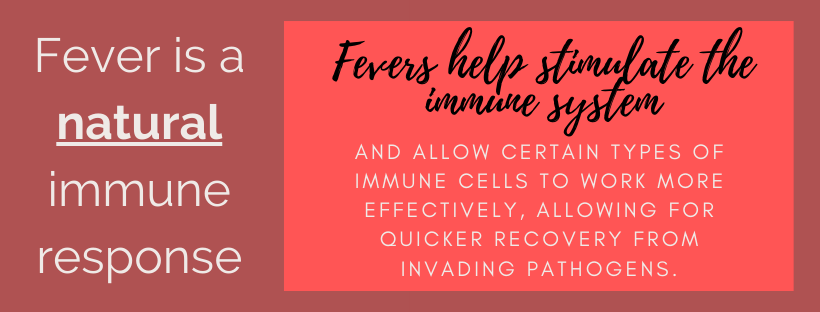“Fever is the healing flame, the great cleanser of the body, and a critical part of a developing child’s immune system.”
How do fevers help?
Fevers raise our core body temperature, which limits the growth and replication of bacteria and viruses.
Fevers help stimulate the immune system and allow certain types of immune cells to work more effectively, allowing for quicker recovery from invading pathogens.
Fevers signal our bodies to rest while important work is done by the immune system to fight infection
What Causes Fevers?
The vast majority of fever are caused by simple viral or bacterial infections, such as cold and flu-like illnesses.
Other less typical causes of fever may include:
Reactions to immunizations
Teething (may cause a mild fever)
Certain autoimmune or inflammatory diseases
Poisoning or environmental toxins
Heat stroke
Side effects of some types of medications
Blood clots
Certain types of cancers
Why reducing a typical fever is usually not helpful
Fevers themselves are typically not dangerous when the cause is known and fluid loss is accounted for. Typically mortality or morbidity associated with fevers is due to more serious underlying conditions, not the fever response itself.
Fevers are part of the body’s natural defense system, so artificially reducing a fever with medications can prolong the illness since the body is not able to fight most efficiently.
Frequent doses of pain relievers and fever reducing medications can have undesirable side effects.
Fever reducers will depress or mask symptoms of illness and will cause adults and children to venture out into public while they are still contagious, which contributes to the spread of viruses.
When should i seek medical attention?
Since there are many reasons why a fever might appear, it’s important to use your own judgement combined with the advice of trusted healthcare providers in each individual scenario. If you have any concerns that you or your child’s fever is not within a safe range, seek medical attention immediately.
Some signs that medical attention may be necessary include:
Presence of underlying immune system problems, due to cancer or other diseases
A fever that continues to rise and sustains past 103°F
Recent travel to another country
Recent exposure to environmental toxins
Any signs of respiratory distress
Prolonged or recurring fevers lasting more than 72 hours
Hallucinations, dizziness, vomiting or other signs of severe distress
Severe lethargy or dehydration
Research and information thanks to Wellness Media Resources! If you’re ready to get you or your kids’ health back on track, schedule your new patient appointment today!






